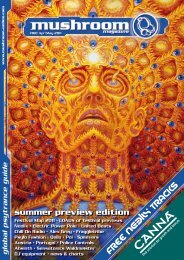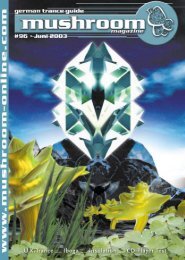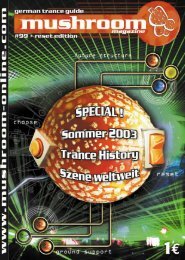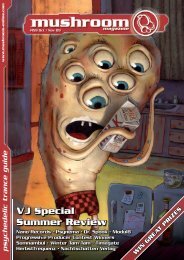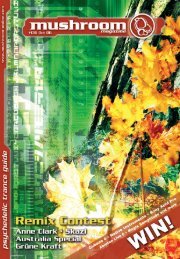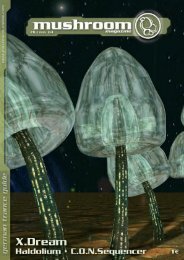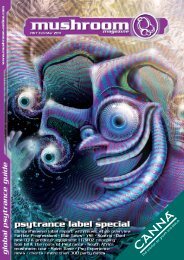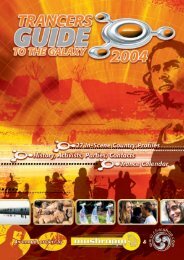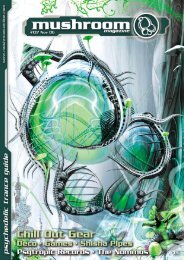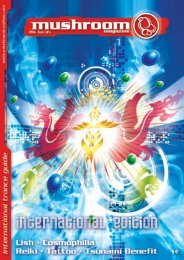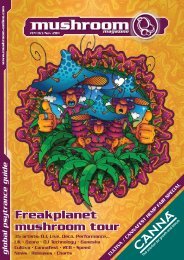Spring Edition - Mushroom online
Spring Edition - Mushroom online
Spring Edition - Mushroom online
You also want an ePaper? Increase the reach of your titles
YUMPU automatically turns print PDFs into web optimized ePapers that Google loves.
NETLABELS 7<br />
§§§ Copyrights & Copylefts §§§<br />
Free distribution - legal and illegal<br />
Copyrights are usually associated with monetary interests. The pun “copyleft”<br />
implies a free distribution of intellectual property. However, even in this way of<br />
distribution the actual copyright remains by the author.<br />
Creative Commons<br />
Creative Commons provides a straightforward copyright and<br />
licensing system that enables creatives to share their work with<br />
the public. The crucial point is that all licensing is free of charge.<br />
An artist might give away for free his work. However, he keeps<br />
the actual copyright and may set various non-monetary conditions,<br />
like e.g. that his material may not be used for commercial<br />
purposes. There is an easy-to-understand system of CC-symbols,<br />
each determining one condition of usage.<br />
www.creativecommons.org<br />
Open Source<br />
Think about recipes: Everyone can use them, but one person<br />
might add a pinch of extra spice, the other might replace lentils<br />
with peas. This is exactly the idea of Open Source. It became<br />
really popular with the rise of computer software. Publishing<br />
the source code of a programme enables everyone to improve<br />
or modify it. The Linux operating system or the Mozilla products<br />
are probably the most popular Open Source software today.<br />
Open Source eventually even became a metaphor for the<br />
freedom of communication that comes with the internet.<br />
ACTA and SOPA<br />
The Stop Online Piracy Act (SOPA) and the Anti-Counterfeiting<br />
Trade Agreement (ACTA) are basically reactions to the massive<br />
illegal exchange of music and movies via the internet which<br />
causes severe economic downturns for the according industries.<br />
Even if many do like to believe that Hollywood is a mega-rich<br />
world anyway, and doesn’t suffer from stealing their products,<br />
the moral problem of stealing is not yet solved. The actual<br />
problem with SOPA and ACTA is that they strive to introduce<br />
measures that severely affect the freedom of information in the<br />
internet and that set questionable models of responsibility. The<br />
entire issue is too complex to be explained in these few lines,<br />
so get informed in the internet and don’t just watch those fancy<br />
3-minute videos, but read a little! www.stopacta.info<br />
Creative Commons<br />
Die Grundidee der<br />
Creative Commons-Lizenzen<br />
ist die gewinnfreie<br />
Weitergabe von geistigem<br />
Eigentum (z.B. Musik,<br />
Fotos), ohne dabei die eigentlichen<br />
Urheberrechte<br />
aus der Hand zu geben.<br />
Dafür stehen verschiedene<br />
Lizenz-Komponenten, wie<br />
z.B. „keine kommerzielle<br />
Nutzung“, zur Verfügung.<br />
Sie werden durch ein<br />
einfaches System von<br />
Symbolen repräsentiert.<br />
ACTA und SOPA<br />
Der Stop Online<br />
Piracy Act (SOPA) und das<br />
Anti-Counterfeiting Trade<br />
Agreement (ACTA) sind<br />
im Grunde Reaktionen auf<br />
den massiven Austausch<br />
von Raubkopien über das<br />
Internet. Das eigentliche<br />
Problem an beiden<br />
Konzepten ist, dass sie<br />
die Informationsfreiheit<br />
im Netz empfindlich<br />
einschränken könnten<br />
und teilweise fragwürdige<br />
Modelle der Verantwortlichkeit<br />
einführen.




